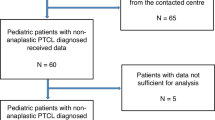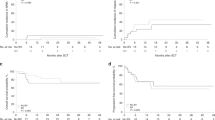Abstract
Intensive chemotherapy with autologous bone marrow transplantation is now considered the treatment of choice for young patients with sensitive relapse of non-Hodgkin’s lymphoma (NHL) but results of this procedure in older patients remain unknown. We evaluated the feasibility of two cycles of salvage therapy followed by an autologous peripheral blood stem cell (PBSC) transplantation in 13 patients aged more than 60 years (median age: 62; range 61–72) suffering from relapsed (n = 10) or refractory (n = 3) aggressive NHL. All patients had previously received first-line treatment containing doxorubicin. An association of ifosfamide, VP16, cytosine-arabinoside with or without high-dose methotrexate was used as salvage and priming therapy prior to collection of PBSC. All patients received G-CSF following salvage therapy. PBSC collection could be performed in 10 patients and yielded a median number of CFU-GM: 98.4 × 104/kg (range 68–369). Nine patients underwent a transplantation using BEAM conditioning regimen. The median time to granulocyte and platelet recovery was 13 days (range respectively: 9–25 and 9–16). One patient died from sepsis after transplantation. The main adverse experience occurring after transplantation was a prolonged decline of performance status. Seven patients achieved a complete remission and one failed to respond. Three patients are still alive in CR. We conclude that PBSC collection was possible in selected patients over 60 years of age with refractory or relapsed aggressive NHL and myeloablative therapy could be used with tolerable toxicity. Hematologic recovery and organ toxicity appears to be similar to those observed in younger patients. Deterioration of performance status after transplantation is the most important factor that could limit this procedure. Further investigations are necessary to determine which patients will be able to benefit by this procedure in terms of survival and quality of life.
This is a preview of subscription content, access via your institution
Access options
Subscribe to this journal
Receive 12 print issues and online access
$259.00 per year
only $21.58 per issue
Buy this article
- Purchase on Springer Link
- Instant access to full article PDF
Prices may be subject to local taxes which are calculated during checkout
Similar content being viewed by others
Author information
Authors and Affiliations
Rights and permissions
About this article
Cite this article
Stamatoullas, A., Fruchart, C., Khalfallah, S. et al. Peripheral blood stem cell transplantation for relapsed or refractory aggressive lymphoma in patients over 60 years of age. Bone Marrow Transplant 19, 31–35 (1997). https://doi.org/10.1038/sj.bmt.1700604
Received:
Accepted:
Issue Date:
DOI: https://doi.org/10.1038/sj.bmt.1700604
Keywords
This article is cited by
-
High-Dose Chemotherapy and Autologous Stem Cell Transplant in Older Patients with Lymphoma
Current Oncology Reports (2015)
-
High-dose chemotherapy and auto-SCT in elderly patients with Hodgkin's lymphoma
Bone Marrow Transplantation (2011)
-
Autologous stem cell transplantation beyond 60 years of age
Bone Marrow Transplantation (2006)
-
Autologous stem cell transplantation in elderly (>60 years) patients with non-Hodgkin's lymphoma: a nation-wide analysis
Bone Marrow Transplantation (2006)
-
Autologous hematopoietic stem cell transplantation for older patients with relapsed non-Hodgkin's lymphoma
Bone Marrow Transplantation (2006)



